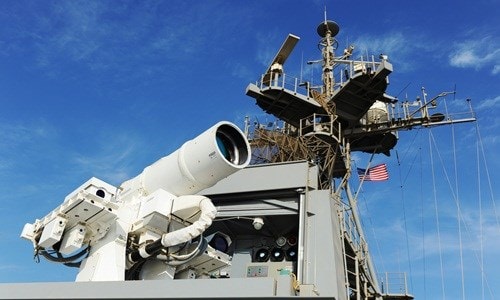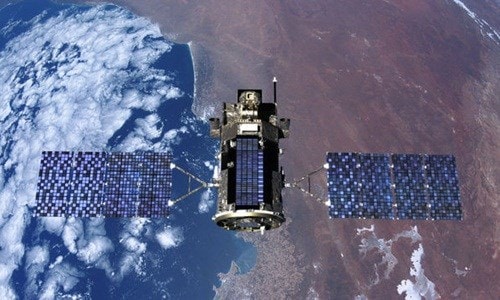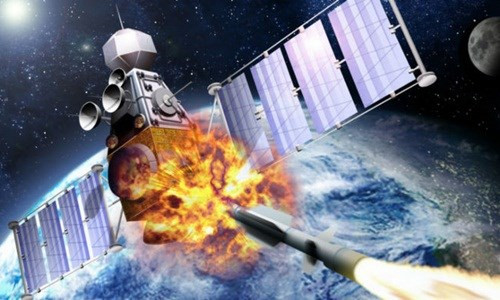US space weapons response scenario
The US military is forced to urgently prepare its capabilities to respond to the scenario of a space war in the context of increasingly developed Russian and Chinese space weapons aimed at the US.
According to CNN, America's rival countries are stepping up the deployment of weapons outside the Earth's atmosphere, forcing the Pentagon to prepare for a space war scenario.
"Every time humans move into a new place, there will be conflict, and in this case, we need to prepare for a space conflict," said General John Hyten, commander of the US Strategic Command.
 |
| Laser guns are equipped on the US Navy's amphibious transport ship USS Ponce. Washington plans to use laser guns as space weapons. Photo: US Navy |
Scary scenario
Today, the United States relies on space technology more than any other nation. In a worst-case scenario, if an adversary launched a massive cyberattack on critical infrastructure, disabling and destroying American satellites in space, television screens would go dark, cell phone networks would go dark, and the Internet would slow down or even stop working.
Everything from stock markets to banking to traffic lights would be paralyzed. Pilots would lose contact with the ground and would have no idea where they were in the sky, and no weather data to steer their planes around storms. World leaders on different continents would be unable to communicate.
US military pilots will lose control of armed drones carrying out missions to destroy terrorists in the Middle East. Smart bombs will become useless. Missiles will remain in their silos. The US may even lose early warning signals of nuclear attacks in many regions of the Earth.
"Our enemies have every incentive to take those powers away from us. This means that if there is a war on Earth, it will almost certainly be initiated by some kind of conflict in space," said Peter Singer, a space threat advisor to the US Department of Defense.
 |
| Russia's Kosmos 2499 satellite in orbit. Photo: Indian Defense News |
Russia, China put weapons into space
Observers say Russia and China are the two rivals that the US must be wary of in space. Beijing and Moscow are targeting US satellites outside the Earth's atmosphere with a series of dangerous weapons, CNN writer Jim Sciutto commented.
Russia has deployed killer satellites, such as the Kosmos 2499, designed to fly close to and, when ordered, disable or destroy American satellites. China has also successfully tested the Shiyan satellite, equipped with a grabber arm capable of yanking American satellites out of orbit. According to Sciutto, these satellites are no longer experimental weapons but are actually operating in a range of orbits from low-Earth orbit, at an altitude of 100 miles (160 kilometers), where the International Space Station (ISS) is located, to middle-Earth orbit at an altitude of 12,500 miles (20,116 kilometers), where global positioning satellites operate, and geostationary orbit at an altitude of 22,000 miles (35,405 kilometers), where most of the U.S. military's early warning and communications satellites are located.
“We would be in for a complete surprise if the US military were not prepared for a war based on what we envision,” said Paul Graziani, chief executive of satellite imagery analysis company AGI.
General John Hyten, meanwhile, warned that adversaries would soon threaten US satellites operating in any orbit around the Earth. "We have good intelligence and surveillance capabilities that allow us to see how these threats are shaping up. So we need to deploy self-defense capabilities," Hyten said.
Hyten was referring to the Air Force Space Command (AFSPC), an agency created in 1982 when Earth’s orbit was relatively peaceful. Today, AFSPC employs about 38,000 people at 134 locations around the world and has an annual operating budget of nearly $8.9 billion. The Pentagon’s plans to expand its space operations could push that budget to $22 billion a year.
One of the units under AFSPC is the 50th Space Wing, a team of more than 8,000 people tasked with monitoring U.S. and foreign military satellites. Currently, they simply observe the emerging space battlefield without the ability to return fire.
 |
| Experts say the next world war will be fought in space. Illustration: Shutterstock |
Fear
In 2015, US Deputy Secretary of Defense Robert Work expressed concern that the US military "is not ready to conduct space operations in the event of a conflict".
He was proven right a few months later when US space forces were overwhelmed in a mock attack on Washington’s military satellites. In April, Work made headlines again when he pledged that the US would “strike back” and “take out” its adversaries if attacked in space.
"If someone tries to target our constellation of satellites in space, we will work to build the capabilities to stop them. Having the ability to shoot down missiles is an advantage," he stressed.
Work suggested developing a space bomb similar to the depth charges dropped by US Navy warships during World War II to counter enemy submarine attacks.
"Our satellite was built 15 years ago and launched at a time when space was a peaceful environment and there were no threats," commented Lt. Gen. David Buck, commander of the Joint Functional Component Command for Space.
“You can think of it like building a refueling plane without having defensive capabilities. When satellites are in danger, our ground infrastructure is in danger. And we’re working to make sure we have the ability to protect them,” Buck stressed.
For now, such weapons exist only as concepts. But the United States is quietly developing advanced capabilities that could one day take on defensive or offensive missions in space.
One such weapon is the Navy’s Laser Weapons (LAWs), which are deployed in the Persian Gulf aboard the amphibious transport dock USS Ponce. The X-37B drone, which has flown multiple missions into space, has also left observers and US adversaries wondering whether it could be used as a weapon.
However, as Russia and China make rapid advances in space, some senior US military commanders warn that Washington is still at risk of losing the next world war because it would be the first war to spread beyond Earth.
"It would be foolish to assume that the possibility of us losing doesn't exist. No matter what defense planners tell you, don't expect a good outcome, prepare for the worst day," Singer asserted.
American politicians and military leaders are re-evaluating how to organize a war to ensure a victorious outcome in a space war scenario.
"How the United States responds to the new space threat could determine who wins the defining conflict of the 21st century," commentator Jim Sciutto concluded.
According to VNE
| RELATED NEWS |
|---|

